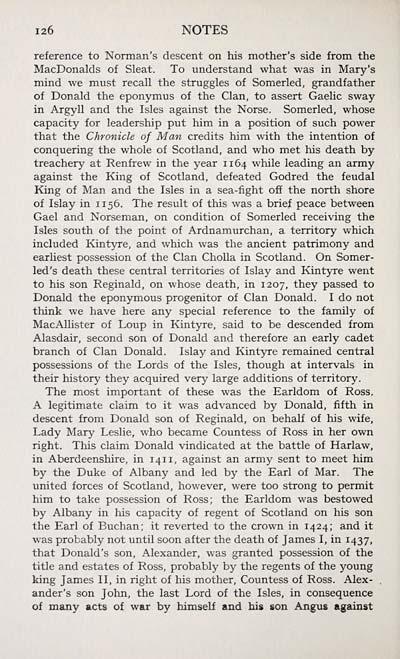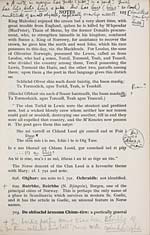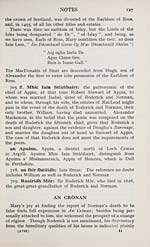Download files
Complete book:
Individual page:
Thumbnail gallery: Grid view | List view

126 NOTES
reference to Norman's descent on his mother's side from the
MacDonalds of Sleat. To understand what was in Mary's
mind we must recall the struggles of Somerled, grandfather
of Donald the eponymus of the Clan, to assert Gaelic sway
in Argyll and the Isles against the Norse. Somerled, whose
capacity for leadership put him in a position of such power
that the Chronicle of Man credits him with the intention of
conquering the whole of Scotland, and who met his death by
treachery at Renfrew in the year 1164 while leading an army
against the King of Scotland, defeated Godred the feudal
King of Man and the Isles in a sea-fight off the north shore
of Islay in 11 56. The result of this was a brief peace between
Gael and Norseman, on condition of Somerled receiving the
Isles south of the point of Ardnamurchan, a territory which
included Kintyre, and which was the ancient patrimony and
earliest possession of the Clan ChoUa in Scotland. On Somer-
led's death these central territories of Islay and Kintyre weiat
to his son Reginald, on whose death, in 1207, they passed to
Donald the eponymous progenitor of Clan Donald. I do not
think we have here any special reference to the family of
MacAllister of Loup in Kintyre, said to be descended from
Alasdair, second son of Donald and therefore an early cadet
branch of Clan Donald. Islay and Kintyre remained central
possessions of the Lords of the Isles, though at intervals in
their history they acquired very large additions of territory.
The most important of these was the Earldom of Ross.
A legitimate claim to it was advanced by Donald, fifth in
descent from Donald son of Reginald, on behalf of his wife.
Lady Mary Leslie, who became Countess of Ross in her own
right. This claim Donald vindicated at the battle of Harlaw.
in Aberdeenshire, in 141 1, against an army sent to meet him
by the Duke of Albany and led by the Earl of Mar. The
united forces of Scotland, however, were too strong to permit
him to take possession of Ross; the Earldom was bestowed
by Albany in his capacity of regent of Scotland on his son
the Earl of Buchan; it reverted to the crown in 1424; and it
was probably not until soon after the death of James I, in 1437,
that Donald's son, Alexander, was granted possession of the
title and estates of Ross, probably by the regents of the young
king James II, in right of his mother, Countess of Ross. Alex-
ander's son John, the last Lord of the Isles, in consequence
of many acts of war by himself and his son Angus against
reference to Norman's descent on his mother's side from the
MacDonalds of Sleat. To understand what was in Mary's
mind we must recall the struggles of Somerled, grandfather
of Donald the eponymus of the Clan, to assert Gaelic sway
in Argyll and the Isles against the Norse. Somerled, whose
capacity for leadership put him in a position of such power
that the Chronicle of Man credits him with the intention of
conquering the whole of Scotland, and who met his death by
treachery at Renfrew in the year 1164 while leading an army
against the King of Scotland, defeated Godred the feudal
King of Man and the Isles in a sea-fight off the north shore
of Islay in 11 56. The result of this was a brief peace between
Gael and Norseman, on condition of Somerled receiving the
Isles south of the point of Ardnamurchan, a territory which
included Kintyre, and which was the ancient patrimony and
earliest possession of the Clan ChoUa in Scotland. On Somer-
led's death these central territories of Islay and Kintyre weiat
to his son Reginald, on whose death, in 1207, they passed to
Donald the eponymous progenitor of Clan Donald. I do not
think we have here any special reference to the family of
MacAllister of Loup in Kintyre, said to be descended from
Alasdair, second son of Donald and therefore an early cadet
branch of Clan Donald. Islay and Kintyre remained central
possessions of the Lords of the Isles, though at intervals in
their history they acquired very large additions of territory.
The most important of these was the Earldom of Ross.
A legitimate claim to it was advanced by Donald, fifth in
descent from Donald son of Reginald, on behalf of his wife.
Lady Mary Leslie, who became Countess of Ross in her own
right. This claim Donald vindicated at the battle of Harlaw.
in Aberdeenshire, in 141 1, against an army sent to meet him
by the Duke of Albany and led by the Earl of Mar. The
united forces of Scotland, however, were too strong to permit
him to take possession of Ross; the Earldom was bestowed
by Albany in his capacity of regent of Scotland on his son
the Earl of Buchan; it reverted to the crown in 1424; and it
was probably not until soon after the death of James I, in 1437,
that Donald's son, Alexander, was granted possession of the
title and estates of Ross, probably by the regents of the young
king James II, in right of his mother, Countess of Ross. Alex-
ander's son John, the last Lord of the Isles, in consequence
of many acts of war by himself and his son Angus against
Set display mode to: Large image | Transcription
Images and transcriptions on this page, including medium image downloads, may be used under the Creative Commons Attribution 4.0 International Licence unless otherwise stated. ![]()
| Early Gaelic Book Collections > Matheson Collection > Gaelic songs of Mary MacLeod > (166) |
|---|
| Permanent URL | https://digital.nls.uk/76611592 |
|---|
| Description | Items from a collection of 170 volumes relating to Gaelic matters. Mainly philological works in the Celtic and some non-Celtic languages. Some books extensively annotated by Angus Matheson, the first Professor of Celtic at Glasgow University. |
|---|
| Description | Selected items from five 'Special and Named Printed Collections'. Includes books in Gaelic and other Celtic languages, works about the Gaels, their languages, literature, culture and history. |
|---|

